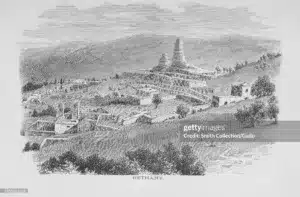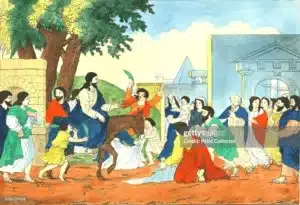Israel Messiah: 5 Key Aspects in Jewish Faith
I. Introduction to Israel messiah
A. Brief explanation of the concept of the Messiah:
The concept of the Messiah is an important and central theme in Jewish, Christian, and Islamic eschatology, although it is understood differently in each of these faiths. In the context of Israel and Judaism, the Messiah is a figure who is expected to come in the future and fulfill various prophetic roles, including the restoration of the Jewish people, the rebuilding of the Temple in Jerusalem, and the establishment of a Messianic age of peace and justice.
In Judaism, there is no single, universally accepted concept of the Messiah, and different Jewish traditions and sects may have different views on the nature and characteristics of the Messiah. Some Jews await a future, human Messiah, while others have more symbolic or metaphorical interpretations of the Messiah. The Messianic concept plays a significant role in Jewish religious and historical thought and has been a source of hope and inspiration throughout Jewish history.
It’s important to note that the concept of the Messiah in Judaism is distinct from the Christian belief in Jesus Christ as the Messiah, and from the Islamic belief in the return of Jesus and the coming of the Mahdi. These concepts have different theological implications and interpretations within their respective religions.
The idea of the Messiah continues to be a topic of discussion, debate, and interpretation within the Jewish community and among scholars of religion. Different Jewish groups and individuals may have varying beliefs and expectations regarding the coming of the Messiah.

B. Significance of the Messiah in Jewish theology and history
The significance of the Messiah in Jewish theology and history is profound and multifaceted. The concept of the Messiah has played a central role in shaping Jewish thought, identity, and history for centuries. Here are some key points highlighting its significance:
-
Hope and Redemption: The Messiah represents a source of hope and redemption for the Jewish people. Throughout history, Jews have faced numerous hardships, including exile, persecution, and dispersion. The idea of a future Messiah who will lead the people to ultimate redemption and a Messianic age of peace and justice has been a source of comfort and resilience in the face of adversity.
-
Covenant and Promise: The concept of the Messiah is closely tied to the covenant between God and the Jewish people. It is seen as the fulfillment of God’s promises to the Jewish people, as outlined in the Hebrew Bible (Old Testament). The Messiah is often regarded as the one who will establish a new covenant and bring about the ultimate realization of God’s promises.
-
Restoration of Israel: The Messiah is expected to play a key role in the restoration of the Jewish people to the land of Israel. This idea is significant because it addresses the historical and spiritual connection between the Jewish people and the land of Israel, which has been a central theme in Jewish theology and history.
-
Rebuilding the Temple: Many Messianic expectations include the rebuilding of the Temple in Jerusalem. The Temple holds a central place in Jewish history and worship, and its reconstruction by the Messiah is seen as a symbol of the reconnection between the Jewish people and their religious heritage.
-
Messianic Age: The Messiah is believed to usher in a Messianic age of peace and justice. This vision of a utopian future has been a driving force in Jewish ethical and moral teachings, emphasizing the importance of working towards a better world and a just society.
-
Diverse Interpretations: The concept of the Messiah is not monolithic in Judaism. There are various interpretations of the Messiah, ranging from a future human leader to more symbolic or metaphorical understandings. This diversity has allowed for different theological perspectives and has been a source of debate and discussion within the Jewish community.
-
Influence on Jewish History: Throughout history, various Messianic figures and movements have arisen, claiming to be the Messiah or seeking to bring about Messianic change. These movements, such as Sabbateanism and Chabad Hasidism, have had a significant impact on Jewish history, even if they ultimately did not lead to the realization of Messianic expectations.
-
Modern Jewish Identity: The concept of the Messiah continues to be an important part of modern Jewish identity. Even in a world where Messianic expectations may be seen as metaphorical or symbolic, the idea of redemption and the pursuit of a better world remains central to Jewish ethics and values.
II. The Messianic Prophecies

A. Overview of key prophecies in the Hebrew Bible (Old Testament) related to the Messiah
Several key prophecies in the Hebrew Bible (Old Testament) pertain to the Messiah. Notable ones include Genesis 3:15, foreseeing a seed of the woman who will defeat evil; Isaiah 7:14, predicting a virgin birth; Isaiah 9:6, heralding a child called “Wonderful Counselor” and “Mighty God”; Micah 5:2, identifying the Messiah’s birthplace in Bethlehem; and Isaiah 53, portraying a suffering servant who will atone for sins. These prophecies collectively create a framework for the Messianic expectation in Judaism and have been foundational in shaping the understanding of the Messiah in Jewish theology and tradition.
B. Role of these prophecies in shaping Messianic expectations
The prophecies in the Hebrew Bible (Old Testament) have played a pivotal role in shaping Messianic expectations within Judaism. They have instilled hope and anticipation of a future savior or anointed one who will fulfill these prophetic descriptions.
These prophecies create a blueprint for the Messiah’s characteristics, birthplace, and mission, influencing the belief that a redeemer will emerge to lead the Jewish people to ultimate redemption and establish a Messianic era of peace and justice. They serve as a foundational source of inspiration, anchoring Jewish identity and spirituality, and have been central to the enduring Messianic tradition and the conviction that God’s promises will be fulfilled through the Messiah.
III. Different Jewish Perspectives
A. Discussion of the diverse beliefs and interpretations regarding the Messiah within Judaism
Judaism exhibits a spectrum of diverse beliefs and interpretations concerning the Messiah. Orthodox Judaism anticipates a future, human Messiah who will fulfill Messianic prophecies. In contrast, Reform Judaism often takes a symbolic or metaphorical view of the Messiah, focusing on the Messianic age as an era of human improvement rather than a specific figure.
Other sects, like Chabad Hasidism, emphasize a personal connection with the late Rebbe Menachem Schneerson as the Messiah. This diversity reflects Judaism’s adaptability and historical evolution, showcasing that while the Messianic concept remains central, interpretations can vary widely among different Jewish traditions and denominations.
B. Overview of traditional, modern, and symbolic interpretations
Jewish interpretations of the Messiah encompass a wide spectrum, from traditional expectations to modern and symbolic interpretations, reflecting the evolving nature of Jewish thought and beliefs.
-
Traditional Interpretations: Orthodox Judaism maintains a conventional and literal belief in a future, human Messiah. Adherents anticipate a descendant of King David who will fulfill Messianic prophecies, restore the Jewish people to Israel, and usher in a Messianic age of peace and justice. This traditional perspective has deep roots in Jewish theology and has been a source of hope and continuity.
-
Modern Interpretations: In contrast, Reform Judaism has adopted a more liberal approach, often viewing the Messiah metaphorically. For many Reform Jews, the focus shifts from an individual Messianic figure to the collective responsibility of humanity to create a better world. This interpretation emphasizes social justice, ethical living, and tikkun olam (repairing the world) as ways to participate in the Messianic process.
-
Symbolic Interpretations: Symbolic interpretations are also present in Jewish mysticism and philosophy. Concepts like the “Messianic spark” suggest that each person has a role to play in bringing about Messianic change through their actions and ethical choices. Some Jewish scholars and mystics view the Messiah as a symbol of human potential, emphasizing inner transformation and spiritual growth.
These diverse interpretations reflect Judaism’s adaptability and its capacity to evolve over time. While the concept of the Messiah remains central to Jewish identity, the varied approaches within Judaism demonstrate a willingness to engage with the Messianic idea in a way that resonates with the values and beliefs of different Jewish communities and denominations.
IV. Historical Perspectives

A. How Messianic hopes have influenced Jewish history and culture
Historical perspectives on the Messiah in Judaism are marked by a rich tapestry of movements, figures, and events that have shaped Jewish thought and identity over the centuries. Here are some key historical perspectives:
-
Second Temple Period: During the Second Temple period (516 BCE to 70 CE), various Messianic expectations emerged. The return from Babylonian exile heightened hopes for a restoration of Israel under a Messianic leader. Figures like Simon bar Kokhba led Jewish revolts against Roman rule in the 2nd century, reflecting Messianic fervor. However, these movements were eventually crushed.
-
Medieval Messianism: In the Middle Ages, Jewish mysticism, particularly Kabbalah, introduced Messianic ideas. Rabbi Isaac Luria’s teachings on the arrival of the Messiah as a part of cosmic redemption became influential. These mystical interpretations added depth to Messianic thinking.
-
Shabbetai Zvi: In the 17th century, Shabbetai Zvi claimed to be the Messiah, garnering a substantial following and causing widespread excitement. When he converted to Islam under threat, it led to disillusionment, but Shabbetianism left a lasting impact on Jewish thought, with followers seeing Zvi’s apostasy as a deeper, mystical act.
-
Chabad Hasidism: Chabad, founded by Rabbi Schneur Zalman of Liadi in the late 18th century, believes that their Rebbe is the Messiah and will return. This belief has led to a strong and active Messianic fervor within the Chabad community.
-
Modern Judaism: In the modern era, as Jewish thought adapted to secularism and intellectual challenges, some movements, particularly Reform Judaism, adopted more symbolic or metaphorical interpretations of the Messiah. Jewish thinkers like Martin Buber emphasized a focus on ethical and interpersonal relationships as a Messianic path.
-
State of Israel: The establishment of the State of Israel in 1948 has been viewed by some as a Messianic event, marking a return to the Jewish homeland after nearly two millennia of dispersion. This historical development has sparked Messianic discussions and debates within the Jewish community.
B. Notable Messianic figures and movements in Jewish history
Jewish history has witnessed several notable Messianic figures and movements that have left a lasting impact on the development of Messianic beliefs and practices. Here are a few:
-
Simon bar Kokhba (132-135 CE): A prominent figure during the Jewish Bar Kokhba revolt, he was hailed as a Messiah by some Jews and led a rebellion against Roman rule. His movement, however, was eventually crushed by the Romans.
-
Shabbetai Zvi (1626-1676): Shabbetai Zvi claimed to be the Messiah, sparking widespread excitement and drawing a considerable following during the 17th century. His apostasy to Islam under duress was a source of disillusionment but left a lasting impact on Jewish thought through Shabbetianism.
-
Chabad Hasidism (Founded in the late 18th century): Chabad Hasidism, founded by Rabbi Schneur Zalman of Liadi, believes in the Messianic role of their Rebbe and anticipates his return. This belief has given rise to a fervent Messianic movement within Chabad Hasidism.
-
Jacob Frank (1726-1791): Jacob Frank claimed to be a Messiah and led the Frankist movement, which merged elements of Judaism and Christianity. Frankism was declared heretical by the rabbinic authorities and had a significant impact on Jewish history.
-
Lubavitcher Rebbe Menachem Schneerson (1902-1994): The seventh Lubavitcher Rebbe, Menachem Schneerson, had a charismatic presence and was revered by many of his followers as the Messiah. His passing in 1994 marked a turning point, leading to diverse beliefs within Chabad regarding his Messianic status.
V. The Future Messiah

A. Expectations and characteristics of the future Messiah in Judaism
In Judaism, expectations of the future Messiah include the following key characteristics:
-
Descendant of David: The Messiah is expected to be a descendant of King David, as prophesied in the Hebrew Bible.
-
Restoration of Israel: The Messiah will lead the Jewish people back to their homeland, playing a central role in the restoration of Israel.
-
World Peace: The Messiah will usher in an era of universal peace, putting an end to wars and conflicts.
-
Rebuilding the Temple: Many Jewish traditions anticipate the rebuilding of the Temple in Jerusalem under the Messiah’s guidance.
-
Gathering of the Exiles: The Messiah will gather Jewish exiles from around the world and unite them in Israel.
-
Universal Knowledge of God: In the Messianic age, knowledge of God will be widespread, and all people will recognize and serve the one true God.
B. The Messiah’s role in the restoration of the Jewish people and the Messianic age
The Messiah’s role in Jewish theology involves the restoration of the Jewish people and the ushering in of a Messianic age. The Messiah is anticipated to lead the return of Jewish exiles to the land of Israel, uniting the Jewish nation.
Under the Messiah’s guidance, the Jewish people will experience a spiritual and physical rejuvenation, with the rebuilding of the Temple and the establishment of Jerusalem as the spiritual center. This era, often referred to as the Messianic age, is characterized by universal peace, justice, and knowledge of God. It represents the fulfillment of divine promises and the ultimate redemption of the Jewish people.
VI. Messianic Symbolism
A. Exploration of symbolic interpretations of the Messiah in Jewish mysticism and philosophy
Symbolic interpretations of the Messiah in Jewish mysticism and philosophy offer alternative perspectives that emphasize inner transformation and spiritual growth. In Kabbalah, a branch of Jewish mysticism, the Messianic concept is often seen as a reflection of cosmic and spiritual principles. The Messiah may represent the collective soul of humanity or the divine spark within each individual. This interpretation shifts the focus from a specific historical figure to the potential for personal enlightenment and spiritual connection.
Hasidic Judaism, a mystical movement founded in the 18th century, also embraces symbolic interpretations. Hasidic Rebbes, spiritual leaders, may be seen as Messianic figures in a metaphorical sense, guiding their followers toward spiritual awakening. The emphasis is on a personal and transformative relationship with the Rebbe rather than a literal expectation of redemption through a future Messiah.
Overall, these symbolic interpretations emphasize the idea that the Messianic journey is an inner one, highlighting the importance of spiritual growth, ethical living, and personal connection to God. They provide a path for individuals to engage with Messianic themes on a deeply personal and spiritual level, promoting a sense of ongoing redemption and connection with the divine.
B. How the concept of the Messiah is used as a symbol of hope and redemption
The concept of the Messiah serves as a powerful symbol of hope and redemption within Jewish theology and culture. It represents the ultimate fulfillment of divine promises and the long-awaited resolution of historical suffering. Here’s how it symbolizes hope and redemption:
-
Hope Amid Adversity: The Messianic idea has historically provided hope and resilience during times of hardship and persecution. Belief in a future Messiah assures that the suffering of the Jewish people will not be in vain.
-
Restoration of the Jewish People: The Messiah is viewed as the agent of the Jewish people’s restoration. This signifies not only a physical return to the land of Israel but also a spiritual rejuvenation, marking a new beginning.
-
Universal Peace and Justice: The Messianic concept embodies the aspiration for a world characterized by universal peace, justice, and knowledge of God. This represents a vision of a better future and the end of human suffering.
-
Divine Promise and Faith: The Messiah’s promise reinforces faith in God’s covenant with the Jewish people. It symbolizes God’s enduring commitment to fulfilling these promises, engendering faith in a brighter future.
-
Personal Transformation: Symbolically, the Messianic concept can be applied to personal growth and redemption. It inspires individuals to strive for inner transformation, ethical living, and spiritual enlightenment as they anticipate a future of ultimate goodness.
VII. Messianic Controversies
A. Discussion of debates and controversies surrounding Messianic claims
Debates and controversies regarding Messianic claims have been a recurring theme in Jewish history. These disputes arise when individuals or movements declare themselves as the Messiah, often leading to division within the Jewish community.
Notable controversies include Shabbetai Zvi’s apostasy to Islam, challenging the authenticity of his Messianic claim, and the ongoing debate within Chabad Hasidism regarding the Messianic status of Rabbi Menachem Schneerson. These controversies reflect the complexity of Messianic expectations and their impact on Jewish identity. They also highlight the diverse range of interpretations and responses to Messianic claims within Judaism.
B. Historical examples of individuals or movements claiming to be the Messiah
Throughout Jewish history, there have been several notable individuals and movements that have claimed to be the Messiah, leading to significant controversy and impact. Here are some historical examples:
-
Shabbetai Zvi (1626-1676): Perhaps one of the most famous Messianic claimants, Shabbetai Zvi gained a substantial following in the 17th century by proclaiming himself as the Messiah. However, his conversion to Islam under duress disappointed his followers and led to a crisis known as the Sabbatean movement, which had lasting effects on Jewish thought.
-
Jacob Frank (1726-1791): Jacob Frank claimed to be a Messiah in the 18th century and founded the Frankist movement, which blended elements of Judaism and Christianity. His followers believed in his Messianic mission, and this led to confrontations with traditional Jewish authorities.
-
Rebbe Menachem Schneerson (1902-1994): The Lubavitcher Rebbe, Menachem Schneerson, was revered by many of his followers as the Messiah. After his death in 1994, some Chabad Hasidim continued to believe in his Messianic status, while others adopted different perspectives.
-
Simon bar Kokhba (d. 135 CE): Simon bar Kokhba led a Jewish revolt against Roman rule in the 2nd century and was hailed as the Messiah by some Jews. The rebellion was ultimately crushed by the Romans, leading to significant loss and dispersion.
VIII. Messianic Relevance Today
A. Contemporary discussions and interpretations of the Messiah in Judaism
Contemporary discussions and interpretations of the Messiah in Judaism reflect a wide spectrum of beliefs and attitudes. While some Orthodox Jews maintain a traditional expectation of a future, human Messiah, many in Reform Judaism embrace symbolic interpretations or focus on ethical teachings as more relevant in the modern context.
Jewish scholars and thinkers engage in theological debates, exploring the concept’s enduring significance and evolving its interpretation to resonate with contemporary values. The establishment of the State of Israel has also added new dimensions to Messianic discussions, as some view it as a Messianic precursor, further emphasizing the dynamic and multifaceted nature of the Messianic concept in contemporary Judaism.
B. The enduring significance of the Messianic concept in Jewish faith and identity
The Messianic concept holds enduring significance in Jewish faith and identity. It represents the promise of redemption and ultimate justice, providing hope and resilience throughout Jewish history, especially in the face of adversity.
The belief in a better future, the return to the homeland, and the fulfillment of divine promises are core elements of Jewish identity. Even with diverse interpretations, the Messianic idea serves as a unifying thread, fostering a sense of purpose and shared destiny among Jewish communities worldwide. It remains a source of inspiration, reminding Jews of their historical journey and their ongoing commitment to building a more just and peaceful world.
IX. Comparisons with Other Religions
A. Brief mention of the differences between the Jewish concept of the Messiah and Messianic beliefs in Christianity and Islam
The concept of the Messiah in Judaism differs significantly from Messianic beliefs in Christianity and Islam.
In Judaism, the Messiah is often seen as a future, human leader who will restore the Jewish people and usher in a Messianic age. The focus is primarily on the collective redemption of the Jewish people and the fulfillment of prophecies within the context of Jewish history.
In Christianity, Jesus Christ is regarded as the Messiah who has already come and fulfilled various Messianic prophecies. Christian beliefs center on his crucifixion, resurrection, and divinity. While there is an emphasis on universal salvation, the focus extends beyond the Jewish people to encompass all of humanity.
In Islam, Messianic beliefs revolve around the figure of the Mahdi, who is expected to appear in the future. The Mahdi will bring justice and righteousness, and his coming is associated with the return of Jesus (Isa) as a prophet. These beliefs align with Islamic eschatology and differ from the Jewish and Christian concepts in their emphasis on Islamic prophetic traditions.
Overall, the primary distinctions lie in the timing and identity of the Messianic figure, the fulfillment of Messianic expectations, and the theological significance attributed to these figures within their respective faiths.
B. Commonalities and shared themes between these religious traditions
-
End-Times and Eschatology: These beliefs are tied to end-times scenarios and eschatological expectations, emphasizing the ultimate resolution of human history.
-
Ethical Imperatives: The coming of the Messianic figure is often linked with ethical imperatives, calling for righteous living and moral conduct among followers.
X. Conclusion
A. Summarize the key points about the Israel Messiah
The Israel Messiah, within the context of Judaism, is a central concept representing hope, redemption, and the fulfillment of divine promises. Key points include:
-
Prophetic Expectations: The Israel Messiah is anticipated as a future figure who will fulfill Messianic prophecies outlined in the Hebrew Bible.
-
Diverse Interpretations: Different Jewish traditions interpret the Messiah in various ways, ranging from a future human leader to more symbolic or metaphorical understandings.
-
Historical Significance: Messianic hopes have played a crucial role in Jewish history, offering resilience and inspiration during times of adversity.
-
Restoration of Israel: The Messiah’s role includes the restoration of the Jewish people to their homeland and the establishment of a Messianic era of peace and justice.
-
Symbol of Hope: The Messiah is a symbol of hope, reflecting the enduring commitment of the Jewish people to a better future, and remains a central and unifying concept in Jewish faith and identity.
-
Comparison with Other Religions: The Jewish concept of the Messiah differs from Messianic beliefs in Christianity and Islam, although there are shared themes of universal redemption and divine intervention.
B. Emphasize the enduring and evolving nature of the Messianic concept within Jewish faith and history
The Messianic concept within Jewish faith and history is both enduring and evolving. It has endured as a symbol of hope and redemption, providing strength and purpose through centuries of challenges.
Yet, it also evolves, reflecting the adaptability of Jewish thought to changing contexts. Diverse interpretations, from the traditional to the symbolic, showcase the dynamic nature of Messianic beliefs. Historical movements and controversies surrounding Messianic figures further underscore its evolving character.
The Messianic concept remains central, serving as a unifying thread, while continually adapting to the shifting theological, social, and historical landscapes of Jewish faith and identity.
